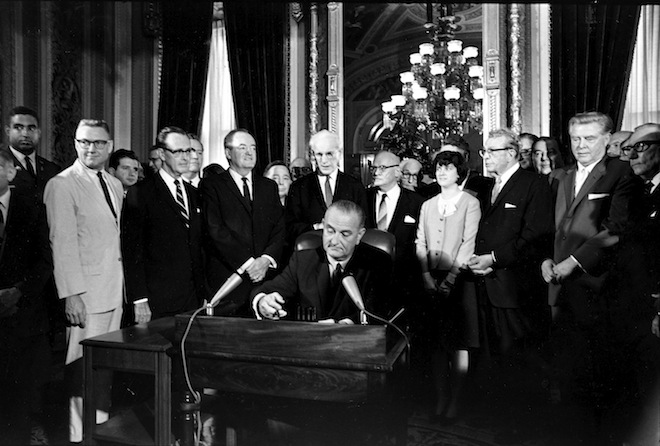When the Supreme Court hears oral arguments next week about the constitutionality of a key element of the Voting Rights Act, the Obama administration and other proponents of the law will be facing five very skeptical justices.
Shelby County v. Holder is the latest in a string of landmark cases that will shape the legacy of the Roberts Court. Proponents of the law are extremely nervous, and privately acknowledge that they face a steep uphill climb in winning over a majority of the justices.
At issue is the validity of Section 5 of the landmark 1965 law designed to quash voter disenfranchisement efforts such as poll taxes and literacy tests. Section 5 requires states and municipalities with a history of racial discrimination (read: mostly in the south) to seek preclearance from the Justice Department or a federal court before making changes to their voting laws. The law was upheld in 1966 by a Supreme Court that deemed it valid to correct the “insidious and pervasive evil” of racism. The law was most recently reauthorized in 2006 by a nearly unanimous Congress, with Section 5 intact.
The votes of down-the-line conservative justices Antonin Scalia, Clarence Thomas and Samuel Alito are not in question. And Chief Justice John Roberts and Justice Anthony Kennedy, the likelier swing votes, both laid the groundwork to strike down Section 5 in a 2009 case when the Supreme Court held that a Texas jurisdiction was eligible to apply for a exemption to Section 5 but refrained from ruling on the constitutionality of the law.
“Things have changed in the South,” Roberts famously wrote in the majority decision — a quote that has made proponents of the Voting Rights Act nervous ever since. “Voter turnout and registration rates now approach parity. Blatantly discriminatory evasions of federal decrees are rare. And minority candidates hold office at unprecedented levels.”
During oral arguments at the time, Kennedy, the most frequent tie-breaking vote on the Court, praised the Voting Rights Act as valid, urgent and essential. But he, too, suggested that Section 5 was unfair. “The question is whether or not it should be continued with this differentiation between the states,” the Reagan-appointed justice said, worrying that the message it sends is that “the sovereignty of Georgia is less than the sovereign dignity of Ohio [and] the sovereignty of Alabama is less than the sovereign dignity of Michigan.”
The 2009 argument happened just months after the nation’s first black president took office. Four years later, months after his re-election, the justices will have an opportunity to render their full decision. For the Roberts court, it’s a momentous ruling that will construct the latest chapter in the ongoing struggle for racial equality in the United States.
The constitutional basis for arguing that Section 5 is invalid is the equal protection clause of the 14th Amendment. Challengers of the law say it discriminates against Americans in certain parts of the country by making it harder for them to make their own rules.
Proponents argue that Section 5 is justified under the 15th Amendment, which empowers Congress to make sure that the right of U.S. citizens to vote “shall not be denied or abridged … on account of race, color, or previous condition of servitude.”
Doug Kendall, president of the left-leaning Constitutional Accountability Center, said the Constitution explicitly validates Section 5. He argued that “[t]he number of cases where preclearance was denied in the 2012 election show that the Plaintiffs are wrong in arguing Section 5 is outdated.”
Arguments are scheduled for Feb. 27 in the high court.






